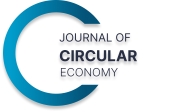Articles published in the Journal of Circular Economy aim to be particularly succinct to reach both academic and practical audiences. Accordingly, we encourage that
articles do not exceed 6,000 words; however, we welcome longer submissions when
the depth or complexity of the topic requires it, leaving the final decision to the
handling editor. Articles published in the Journal of Circular Economy must include implications for circular economy practice.
The following types of articles are published in Circular Economy:
Research article: Standard research papers of 3,500 – 6,000 words in length, excluding tables, illustrations, and references. Length exceptions may be granted by the Handling Editor on a case by case basis. Length exceptions may be granted by the Handling Editor on a case by case basis.
Review: Articles which summarize the state-of-the-art circular economy research in a particular sub-field. Narrative reviews, meta-syntheses and meta-analyses are considered. 4,500 – 6,000 words in length, excluding tables, illustrations and references.
Perspective: Papers in an “op-ed” style that share a particular perspective on circular economy. Usually 800-1,000 words excluding tables, illustrations, and references. Length exceptions may be granted by the Handling Editor on a case by case basis.
Articles published in the Journal of Circular Economy are accompanied by an abstract that is ca. 150 words. Suggested structure of Research articles and Reviews: Introduction, theoretical framing, methods, results, discussion, recommendations. There is no suggested structure for Perspectives.
